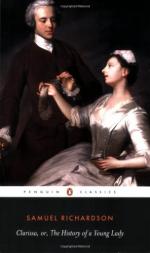They answered, that that was not their case; and that they had since inquired into the lady’s character and manner of life, and were very much concerned to think any thing they had said should be made use of against her: and as they heard from Mrs. Smith that she was not likely to live long, they should be sorry she should go out of the world a sufferer by their means, or with an ill opinion of them, though strangers to her. The husband offered to write, if I pleased, to Mr. Brand, in vindication of the lady; and the two women said they should be glad to wait upon her in person, to beg her pardon for any thing she had reason to take amiss from them; because they were now convinced that there was not such another young lady in the world.
I told them that the least said of the affair to the lady, in her present circumstances, was best. That she was a heavenly creature, and fond of taking all occasions to find excuses for her relations on their implacableness to her: that therefore I should take some notice to her of the uncharitable and weak surmises which gave birth to so vile a scandal: but that I would have him, Mr. Walton, (for that is the husband’s name,) write to his acquaintance Brand as soon as possible, as he had offered; and so I left them.
As to what thou sayest of thy charming cousin, let me know if thou hast any meaning in it. I have not the vanity to think myself deserving of such a lady as Miss Montague; and should not therefore care to expose myself to her scorn and to thy derision. But were I assured I might avoid both of these, I would soon acquaint thee that I should think no pains nor assiduity too much to obtain a share in the good graces of such a lady.
But I know thee too well to depend upon any thing thou sayest on this subject. Thou lovest to make thy friends the objects of ridicule to ladies; and imaginest, from the vanity, (and, in this respect, I will say littleness,) of thine own heart, that thou shinest the brighter for the foil.
Thus didst thou once play off the rough Mowbray with Miss Hatton, till the poor fellow knew not how to go either backward or forward.
LETTER XLIII
Mr. Belford, to Robert Lovelace,
Esq.
Thursday, 11 o’clock, Aug. 31.
I am just come from the lady, whom I left cheerful and serene.
She thanked me for my communication of the preceding night. I read to her such parts of your letters as I could read to her; and I thought it was a good test to distinguish the froth and whipt-syllabub in them from the cream, in what one could and could not read to a woman of so fine a mind; since four parts out of six of thy letters, which I thought entertaining as I read them to myself, appeared to me, when I should have read them to her, most abominable stuff, and gave me a very contemptible idea of thy talents, and of my own judgment.




